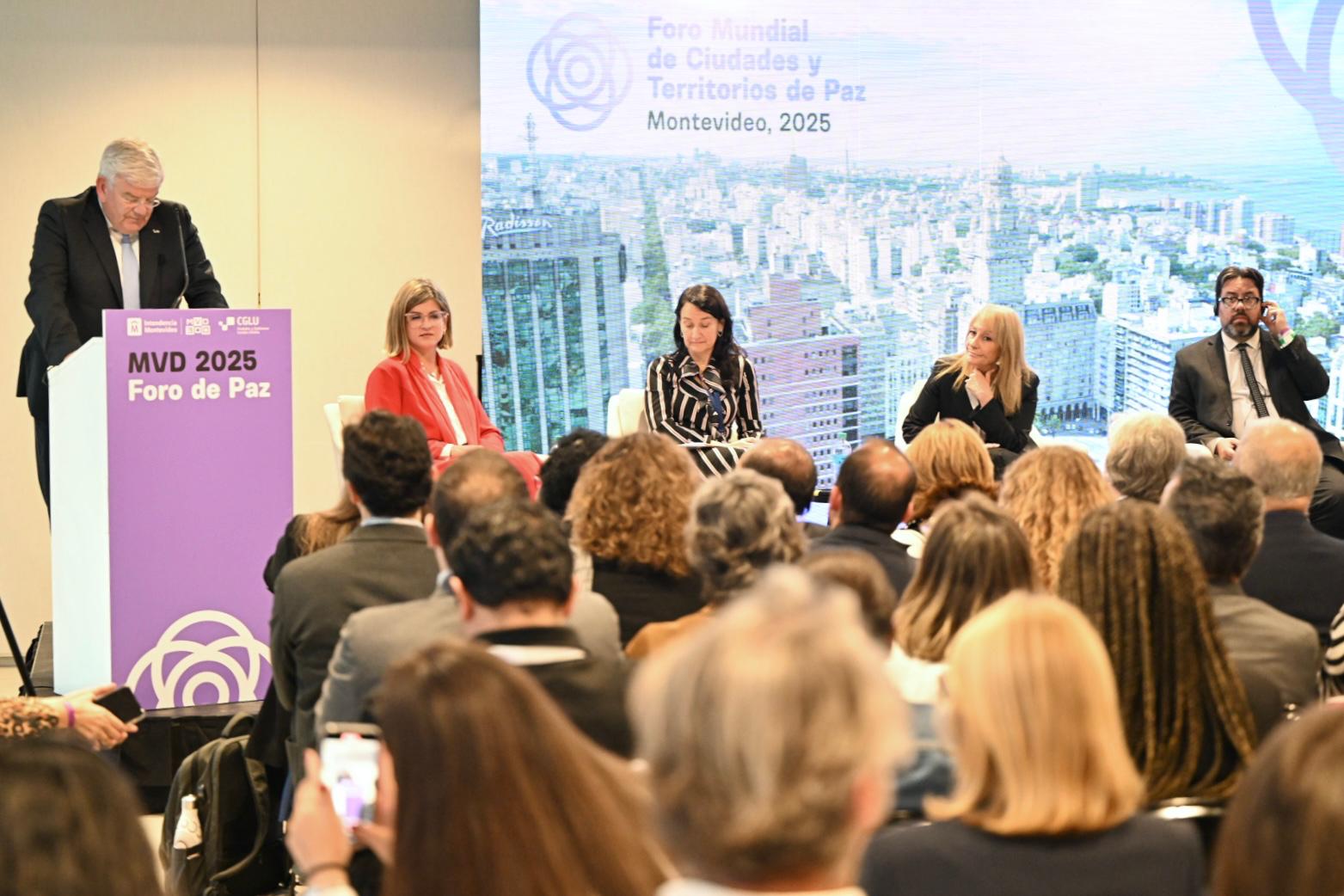The World Forum on Cities and Territories of Peace adopts the Montevideo Declaration
07.05.2025

At the close of the 5th World Forum of Cities and Territories of Peace, hosted in Montevideo, local and international leaders, partners from the International Organising Committee of the Forum, and partners from the United Nations and the civil society, came together to adopt a bold and urgent commitment: the Montevideo Declaration, a roadmap for peace rooted in justice, inclusion, and local governance.
In his closing remarks, Mauricio Zunino, Mayor of Montevideo, emphasized a central tenet of the forum: “Peace is not only the absence of conflict, but the active presence of justice, equity, and coexistence.” With these words, he called upon local governments to take the lead in building sustainable peace from the ground up, reaffirming the vital role cities and territories play in shaping global agendas.
“Whether it’s reducing violence in cities, whether it’s making cities safer, welcoming refugees with open arms, bringing different communities together, or helping former fighters lay down their weapons — the ways local governments contribute to peace are boundless, and profoundly impactful. We need to be acknowledged as such.” Jan Van Zanen, President of UCLG, Mayor of The Hague.
The national government of Uruguay, represented by Vice President and former UCLG President Carolina Cosse, addressed that peace is often borne of uncertainty and the collapse of universal social norms, and the importance of always working from the ground.
“Under this circumstance of uncertainty, what can we do? The answer is simple: search for the truth. A truth that is always found locally, in our homes, neighborhoods, and workplaces. The issues and urgencies are there, as is always hope. Hope is born locally, and this is why it is importance that local peacebuilding summons us here.” Carolina Cosse, Vice President of Uruguay.
Building on a Legacy of Local Diplomacy
The Forum in Montevideo is the latest milestone in a global process that began in Madrid in 2017, and continued through Mexico City and Bogotá. The Forums aimed to broaden the understanding of Peace; not as the opposite of conflict but, rather, as the ways in which local and regional governments could peacefully solve conflict and prevent them from devolving into violence.
The Forums in Madrid and Bogotá brought human rights and care -in the form of public policy that protect communities, and as public services that care for populations- as innovations to broaden what is possible in local peacebuilding.
This Peace Forum in Montevideo is the legacy of the leadership of the women of UCLG. Since its foundation by mayor Manuela Carmena in Madrid, to the commitment from Claudia Sheinbaum (México City) Claudia López (Bogotá) and Carolina Cosse (Montevideo), female leadership has been an essential part to understand what a world without violence can look like. Throughout the Forum, women leaders have continued to demonstrate how women are undoubtedly part of the way out of a world of violence. They highlighted the importance of harnessing care policies to build peace. They argued for the need to dismantle structures of power that contribute to generating violence—something that can only be achieved through feminist leadership.
The Montevideo Declaration draws on these learnings, as well as the legacy of UCLG such as the UCLG Peace Prize, the Mercociudades Commitment to Care, and regional coalitions against discrimination and xenophobia; and heightening the importance of public participation, financing the peace agenda, and developing narratives that overcome narratives of hatred and violence.
The Declaration also acknowledges the commitment to local and territorial diplomacy that began in 1913, with the origins of the municipal movement and the aim of transforming the international system and harnessing transformative diplomacy.
The Montevideo Declaration: Peace for people, planet, and government.
- 1. People-Centered Peace:
Local authorities agreed that tackling structural violence and inequality is essential. This includes ensuring access to housing, justice, and basic services, while actively fighting racism, xenophobia, and gender inequality. The Declaration stresses the need for inclusive governance, with special attention to youth and marginalized communities.
- 2. Environmental Justice for a Peaceful Future:
Recognizing the deep link between ecological health and social stability, the Declaration calls for urgent integration of climate justice into public policy. The protection of common goods — air, water, land — is framed as a fundamental peace strategy. Cities must also become more resilient to climate crises to protect vulnerable populations.
- 3. Governance for Peace:
The role of local governments as peacebuilders is underscored through commitments to democratic education, social inclusion, and conflict prevention. The Declaration advocates for real coordination between different spheres of government, and developing spaces that can enable and strengthen the voices of local and regional governments in international decision-making and peacebuilding forums.
The importance of the Montevideo Declaration will go beyond the outcome document of the Forum. It aims at becoming a political compass, that will guide the peacebuilding aspect of the World Organization, building on the Hague Charter for Municipal Peace and strengthening commitments from local and regional governments and civil society towards shared action.
As the Forum concluded, participants expressed hope that the Montevideo Declaration would become a foundational document for municipal peacebuilding efforts around the world — a testament to the transformative power of local and regional leadership in an increasingly interconnected world.
The International Organizing Committee of the Forum, a collective of organizations engaged in local peacebuilding and city diplomacy that have accompanied the Forum since its inception has been integral to its success. The Committee includes organizations such as AIPAZ, the Barcelona Provincial Council, Mayors for Peace, UNDP, and the UCLG Peace Price- as well as local and regional government networks that supported the Forum -Mercociudades, FLACMA, Metropolis, and UCLG ASPAC- and the legacy cities -Bogotá, Mexico City, Barcelona and Madrid-; and international partners such as UNESCO, UN Women, and the Iberoamerican Development Bank- all of which have proven essential to provide content, ideas, and a future-looking vision for the Forum, as well as building alliances for local peacebuilding.
Read the Declaration here.